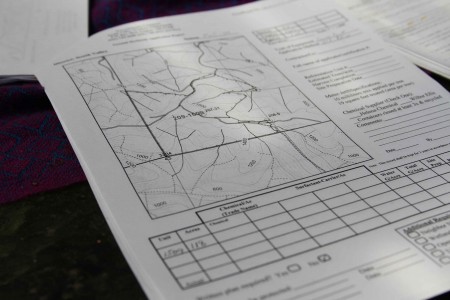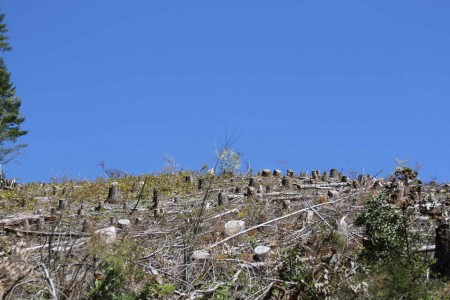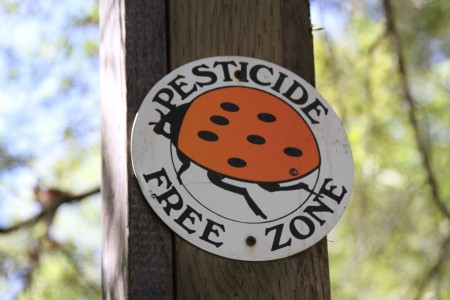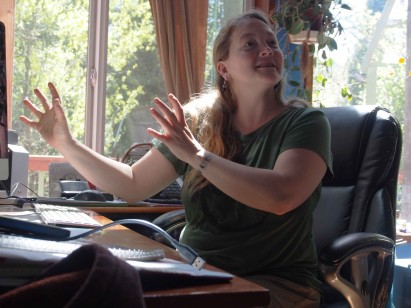"There is no commerce if there is no nature. We depend on nature for everything. Once everybody realizes that, maybe they’ll start protecting it a little better."
In March of 2008, Eron King looked out her son’s bedroom window and saw a helicopter spraying pesticides over a nearby clear-cut. Within the week, Eron and her family began experiencing intense coughing fits and regular nosebleeds. She began doing research to find out what was going on and reached out to her community to try and find answers.
King moved out to Triangle Lake, Oregon in search of a more peaceful and serene environment to live in. She describes herself as a headstrong and persistent person. She has many opinions, but she’s always searching for facts to back them up. In addition to homeschooling her kids, she also takes care of her family farm, including dogs, cats, chickens, and goats.

Since the initial spray, King has worked tirelessly to prove the correlation between pesticide spray and her family and community’s health issues. King filmed several aerial sprays outside her home to document the timing between each event and the onset of symptoms. Finally, over 40 residents of Triangle Lake received urine testing and almost every single one of them came back positive for 2,4-D and atrazine. The pesticide imazapyr was found in the water behind the local school, but regulatory agencies said samples reflected “safe” levels. King was not shy to share her opinion on the findings; the OHA reported “it was below the ‘safe’ level [of imazapyr],” she explained, adding “‘so it’s okay for your kindergartener to go to school five days a week and drink that water till you graduate high school?’ That is preposterous. I would never let my child do that.”
That first instance of witnessing the aerial pesticide spray in 2008 is what really set Eron King’s activism in motion. She spent years pleading to the Board of Forestry to protect both the community and the surrounding environment, including salmon in the local creek. She tried to get access to notifications, but even those weren’t enough:

“The only way these notifications are going to help us is if they give us the exact time of day, and that’s still not going to help, you know, because I can’t pack up my chickens and my goats and take them with me to the coast; that’s unrealistic. So why would they think that notification is going to help us? Because I eat those eggs, and I drink that milk, so if those guys are exposed then we’re still exposed.”
In 2011, King was introduced to the Community Rights movement, which focuses on addressing underlying issues surrounding human and environmental rights. Community Rights allows people to stand up together for what they believe in and demand more rights for the community through creating local ordinances.
“We are creating local ordinances to ban the harms that we don’t want in our communities, knowing full well that they will probably go to court, like most of them have here on the west coast, but then the corporations have to come in and say it out loud, ‘we have more rights than these communities.’ I think once people hear that out loud, it’s a little bit more impactful.”

Although King has worked with many environmental organizations in the past, she found that “they never talked about fixing the problem.” Instead, they called for “maybe a little more regulation, maybe a little less poison is allowed — but we want to say no, these communities want to say no. We don’t want to be sprayed, and we need to work on getting to that point.” With her family as her main motivation, King is determined to end aerial pesticide spray in Oregon.

Along the way, Eron has met her share of resistance, but she’s also learned how to connect with people by creating a space for community discussion. “This community is a logging community. It is very divided. So we’ve made friends, and I’d say almost enemies.’ With an issue that is so heated, finding a way to communicate is important. When she was first sprayed, Eron had dreadlocks and found that she wasn’t being taken seriously. “Once I cut my dreadlocks off people had to look at me… they had to talk to me and take me seriously.” She’s found that some community members deny that pesticides affect health. While they might not experience symptoms, King encourages them to consider how pesticides are differentially experienced. “Everyone’s body is different, everyone’s body reacts to things differently, sure you may not be affected, but you need to understand that some people are affected, very very greatly.”

In terms of the future, Eron King has a very optimistic outlook. To support her argument, she leans on the facts. There are federal forestlands, which currently do not allow spraying but are still home to healthy trees and a healthy natural environment. She envisions Oregon with a ban on all aerial spraying of pesticides both roadside and in the forests. King’s advice is, “to stay strong, shed light on the problem, tell your story; stories are effective and I don’t think enough of the right stories are told.”
In the end, she says, “I try to find any way I can to make a change.”

